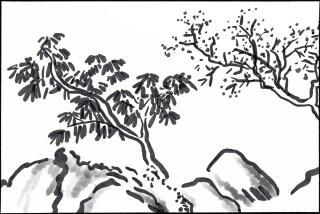Erica Jong on Moms, Daughters, Jewish Heritage
- Share via
“Inventing Memory” is an ingeniously constructed, entertaining chronicle of four generations of women in a Jewish American family. It spans from 1905, when matriarch Sarah Sophia Solomon Levitsky arrives in New York from Russia, to 2005, when her great-granddaughter Sara Wyndham becomes the resident scholar at the Council on Jewish History in New York.
Sara knows little about Judaism or her roots, having “been raised largely in Montana by a poet father who believed that fly-fishing and religion were the same thing, and later in Europe by a divorced mother who worshiped only at the shrines of AA and room service.”
Rummaging through the council archives, she discovers documents from her own family--including an oral history given by her great-grandmother. “I’ve become passionate about the history of the Jews. . . ,” says Sara, “I would like nothing better than to rescue these women from oblivion.”
It seems unlikely Sara’s ancestors need rescuing since they were all famous. Great-grandmother Sarah was a successful painter, grandmother Salome a celebrated avant-garde writer and mother Sally Sky a “mythic” folk singer. Not a housewife, president of the temple sisterhood or Jewish princess among them, though Salome’s Aunt Sylvia “is one of those women who know how to turn male guilt into diamonds.”
These spectacular overachievers make the novel seem like the author is channeling her fantasy past lives.
Despite all the pithy Yiddish sayings (the author has included a glossary) and philosophizing (“Why are Jews funny? Consider the alternative. We laugh so as not to drown in our own tears.”), “Inventing Memory” lacks a spiritual core. None of the characters is observant, and though Jong hits all of the cultural hot buttons--pogroms, Yiddish theater, the Holocaust, Hollywood blacklist--it feels like an intellectual venture into Belva Plain land, albeit a wickedly insightful one.
*
Speaking of assimilated Jews, Jong notes: “Interest rates they worry about--and development deals and final cut. They accumulate heavy things that cannot be moved in a pogrom. This is a measure of how secure they feel. They do not expect that the Jews will be trapped in Benedict Canyon as in the Warsaw ghetto.”
Her heroines are remarkably guilt-free. “I may be a Yiddishe mama, but I’m a red-hot Yiddishe mama,” boasts Sarah. She sails to America in steerage, yet manages to meet first-class passenger Sim Coppley, scion of a New York Gentile family, who teaches her some English on board and later searches the Lower East Side for “the goddess he had met on the ship.” Sarah becomes the apex of a love triangle between Sim and Lev Levitsky, an artist who won’t sleep with her but whom she marries anyway.
Her only daughter, Salome Levitsky, is fathered by Sim, but believes otherwise. Rebelling against Sarah, for no other reason than to support the author’s premise that a daughter must turn on her mother to claim her own life, Salome conquers Paris in the ‘20s. She collects Picassos, hangs out with the Fitzgeralds, has an affair with Henry Miller (Miller was the subject of a 1993 memoir by Jong) and writes the scandalous “A Bad Girl in Paris,” a lusty romp that echoes Jong’s own lusty romp, “Fear of Flying.”
Salome’s incessant coupling becomes more amusing than titillating. Speaking of Miller, she observes in a letter, “He also does another thing well, with a kind of abandon and--shall we say--moxie that makes you think your womb has been visited by a shower of golden rain.” When she writes the first Holocaust novel (supposedly in 1952, before, as Jong writes, “there was no business like Shoah business”), Salome notes in her journal: “Howard Fast gave me a rave blurb.” (Screenwriter, novelist and author of “The Immigrants” saga, Fast is Jong’s former father-in-law and mentioned more than once in the story.)
Salome gives birth to the fabled but finally dull singer Sally Sky, who “lives on vitamin pills and fruits and nuts and vodka” and has a predictable difficulty handling fame.
Anyone interested in Jewish culture will be intrigued by Jong’s facile re-creation of history. Fans of her first novel, “Fear of Flying,” will welcome Jong’s most passionate novel in years.
More to Read
Sign up for our Book Club newsletter
Get the latest news, events and more from the Los Angeles Times Book Club, and help us get L.A. reading and talking.
You may occasionally receive promotional content from the Los Angeles Times.









